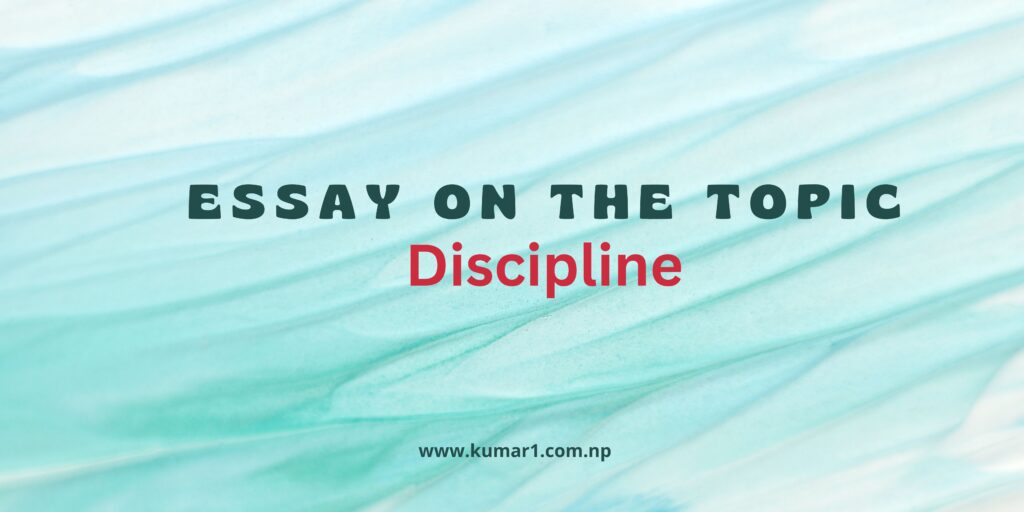
Essay on Discipline
Write an essay on the topic "Discipline" in about 2000 words.
Discipline is a fundamental trait that governs every aspect of human life, influencing our behavior, decisions, and overall success. It is often described as the bridge between goals and accomplishments, guiding individuals to act in a structured, organized manner. Discipline is not just a tool for personal growth but also a vital element in societal development, contributing to the harmony and stability of communities. This essay explores the concept of discipline, its significance, various forms, and its impact on different spheres of life, emphasizing its importance as a cornerstone for achieving success and maintaining order in both personal and collective contexts.
Advertisement helps us to grow
essay on Discipline
Understanding Discipline
Discipline, in its essence, refers to the practice of training oneself to follow a set of rules or a code of conduct. It involves self-control, determination, and the ability to adhere to guidelines or standards, even in the face of challenges or temptations. Discipline is often associated with self-regulation, where an individual exercises control over their actions, thoughts, and emotions to align with specific goals or societal norms.
There are two primary types of discipline: self-discipline and external discipline. Self-discipline is the internal control one exerts over their behavior, driven by personal values, goals, and motivations. External discipline, on the other hand, is imposed by external factors such as parents, teachers, laws, or societal expectations. Both forms of discipline are essential in shaping an individual’s character and determining their success in various aspects of life.
The Importance of Discipline in Personal Life
Achievement of Goals:
Discipline is the backbone of goal attainment. Without discipline, aspirations remain mere dreams, unfulfilled and unattainable. Whether it’s academic success, professional achievements, or personal development, discipline ensures that one stays focused, motivated, and persistent. It helps in setting realistic goals, creating action plans, and following through with consistency and dedication. For instance, students who practice discipline in their studies tend to excel academically, as they are able to manage their time effectively, prioritize their tasks, and stay committed to their learning objectives.
Development of Character:
Discipline plays an important role in shaping an individual’s character. It instills values such as honesty, integrity, responsibility, and respect for others. A disciplined person is likely to make ethical decisions, act with honesty, and uphold their commitments. This strong moral foundation contributes to building a trustworthy and reliable character, earning respect and admiration from others. Discipline also fosters resilience, enabling individuals to cope with adversity and bounce back from setbacks with determination and perseverance.
Mental and Emotional Stability:
Discipline contributes to mental and emotional well-being by promoting a sense of order and control in one’s life. It helps individuals manage their emotions, avoid impulsive behavior, and maintain a balanced outlook on life. Through disciplined practices such as mindfulness, meditation, and regular physical activity, individuals can enhance their mental clarity, reduce stress, and improve overall emotional health. Moreover, discipline in maintaining healthy relationships, managing conflicts, and setting boundaries ensures emotional stability and harmonious interactions with others.
Physical Health and Fitness:
Maintaining physical health requires discipline in various aspects such as diet, exercise, and sleep. A disciplined approach to healthy eating, regular physical activity, and adequate rest can prevent lifestyle-related diseases, enhance energy levels, and promote overall well-being. For instance, athletes and fitness enthusiasts achieve their physical goals through strict training regimens, balanced diets, and disciplined lifestyles. Similarly, individuals who practice discipline in their daily routines are more likely to lead healthy, active lives, free from the negative effects of poor habits and lifestyle choices.
Discipline in Professional Life
Workplace Efficiency and Productivity:
In the professional sphere, discipline is a key factor in achieving efficiency and productivity. Employees who exhibit discipline in their work habits are punctual, organized, and focused on their tasks. They are able to manage their time effectively, meet deadlines, and produce high-quality work. Discipline in the workplace also involves adhering to company policies, following protocols, and maintaining a professional demeanor. This not only contributes to individual success but also enhances the overall performance and reputation of the organization.
Leadership and Management:
Effective leadership is deeply rooted in discipline. Leaders who practice discipline are able to inspire and motivate their teams, set clear goals, and maintain a sense of order and direction. They lead by example, demonstrating the importance of discipline in achieving success and fostering a positive work environment. Discipline in leadership also involves making tough decisions, managing resources efficiently, and maintaining accountability. This disciplined approach to management ensures that the organization runs smoothly, with minimal conflicts and maximum productivity.
Career Advancement:
Discipline is a driving force behind career growth and advancement. Professionals who consistently demonstrate discipline in their work are more likely to earn promotions, receive recognition, and achieve their career goals. They are seen as reliable, dedicated, and capable individuals, qualities that are highly valued in any profession. Moreover, discipline in continuous learning and skill development enables professionals to stay relevant in their fields, adapt to changing trends, and seize new opportunities for growth.
Advertisement helps us to grow
The Role of Discipline in Education
Academic Success:
Discipline is a critical factor in academic achievement. Students who practice discipline in their studies are more likely to excel academically. They can manage their time effectively, focus on their studies, and avoid distractions. Discipline helps students develop good study habits, such as regular revision, completing assignments on time, and seeking help when needed. It also fosters a positive attitude towards learning, encouraging students to take responsibility for their education and strive for excellence.
Classroom Management:
Discipline is essential for maintaining order and a conducive learning environment in the classroom. Teachers who enforce discipline create a structured environment where students can focus on learning without disruptions. Classroom discipline involves setting clear rules, establishing expectations, and implementing consistent consequences for misbehavior. This ensures that students understand the importance of following rules and respecting others, leading to a positive and productive learning atmosphere.
Character Education:
Schools play a vital role in teaching discipline as part of character education. Through various activities, programs, and curricula, students learn the importance of discipline in their daily lives. They are taught values such as respect, responsibility, and perseverance, which are reinforced through disciplined behavior. This character education helps students develop into responsible, ethical, and disciplined individuals who contribute positively to society.
Discipline in Society
Law and Order:
Discipline is the foundation of law and order in society. Laws and regulations are established to maintain discipline, ensuring that individuals act in a manner that is consistent with societal norms and values. Discipline in following the law promotes social harmony, prevents chaos, and protects the rights and freedoms of individuals. Without discipline, society would descend into disorder, with individuals acting solely in their self-interest, leading to conflicts and injustice.
Social Harmony and Cooperation:
Discipline fosters social harmony by encouraging cooperation and mutual respect among individuals. In a disciplined society, people understand the importance of working together, following rules, and respecting others’ rights and opinions. This leads to a sense of unity and cooperation, where individuals work towards common goals and contribute to the well-being of the community. Discipline also promotes tolerance and understanding, helping to resolve conflicts peacefully and maintain social cohesion.
National Development:
Discipline is essential for national development. A disciplined population is more likely to adhere to laws, participate in civic duties, and contribute to the country’s progress. Discipline in governance ensures that public resources are used efficiently, policies are implemented effectively, and corruption is minimized. This disciplined approach to nation-building leads to sustainable development, economic growth, and improved quality of life for citizens.
Challenges to Practicing Discipline
While the importance of discipline is widely recognized, practicing it consistently can be challenging. Various factors can hinder discipline, such as procrastination, lack of motivation, external distractions, and negative peer influences. Overcoming these challenges requires a strong will, determination, and the support of a positive environment.
Procrastination:
It involves delaying tasks and making excuses for not completing them on time. To overcome procrastination, individuals need to develop time management skills, set clear goals, and create a structured routine. Breaking tasks into smaller, manageable steps can also help in maintaining focus and discipline.
Lack of Motivation:
A lack of motivation can undermine discipline, leading to a loss of focus and commitment. To maintain motivation, it is important to set meaningful goals, find intrinsic motivation, and celebrate small achievements. Surrounding oneself with positive influences, such as supportive friends, mentors, or motivational content, can also help in staying disciplined.
External Distractions:
In today’s fast-paced world, external distractions such as social media, entertainment, and peer pressure can disrupt discipline. To minimize distractions, individuals need to create a focused environment, set boundaries, and practice self-control. It is also helpful to schedule specific times for leisure activities, ensuring that they do not interfere with important tasks.
Negative Peer Influence:
Peer influence can either support or hinder discipline. Negative peer pressure can lead individuals to engage in undisciplined behavior, such as skipping classes, engaging in risky activities, or neglecting responsibilities. To counteract negative influences, individuals need to build a strong sense of self-awareness, choose friends who share similar values, and seek support from positive role models.
Strategies for Cultivating Discipline
Cultivating discipline requires consistent effort and the development of positive habits. Here are some strategies to help build and maintain discipline:
Goal Setting:
Setting clear, achievable goals is the first step in cultivating discipline. Goals provide direction and purpose, motivating individuals to stay focused and committed. It is important to set both short-term and long-term goals, breaking them down into manageable steps. This makes it easier to track progress and maintain discipline over time.
Time Management:
Effective time management is crucial for maintaining discipline. By organizing time efficiently, individuals can prioritize tasks, reduce stress, and avoid the temptation to procrastinate. Creating a daily schedule or to-do list can help in allocating time for various activities, ensuring that important tasks are completed on time. Additionally, time management allows for a balanced life, where time is set aside for work, rest, and leisure, promoting overall well-being.
Building Healthy Habits:
Discipline is closely linked to the formation of healthy habits. Habits are behaviors that, once established, require less conscious effort to maintain. By consistently practicing positive actions—such as regular exercise, healthy eating, or punctuality—these behaviors become second nature. Establishing a routine that includes these habits can reinforce discipline, making it easier to stick to goals and maintain order in life.
Mindfulness and Reflection:
Mindfulness involves being aware of one’s thoughts, actions, and emotions in the present moment. Practicing mindfulness can help in cultivating discipline by enhancing self-awareness and self-control. Regular reflection on one’s progress, setbacks, and areas for improvement also contributes to maintaining discipline. By taking time to assess and adjust behaviors, individuals can stay on track and continue to grow.
Accountability:
Holding oneself accountable is a powerful motivator for maintaining discipline. This can be achieved through self-monitoring, where individuals track their progress and evaluate their adherence to goals. Additionally, sharing goals with a trusted friend, mentor, or group can provide external accountability, where others offer support and encouragement. Accountability ensures that individuals remain committed to their goals, even when faced with challenges.
Positive Reinforcement:
Rewarding oneself for small achievements can reinforce disciplined behavior. Positive reinforcement, such as treating oneself after completing a task or celebrating milestones, encourages continued effort and persistence. This approach creates a positive association with discipline, making it more enjoyable and sustainable over the long term.
The Role of Discipline in Global Success
Discipline is not just a personal virtue but also a critical factor in the success of societies and nations globally. Countries that prioritize discipline in their governance, education, and public life tend to be more prosperous, stable, and harmonious. For example, nations with disciplined workforces often experience higher productivity, innovation, and economic growth. Similarly, disciplined governance, characterized by transparency, accountability, and rule of law, leads to effective management of resources and sustainable development.
In education, countries that emphasize discipline in schools tend to have higher academic standards and better educational outcomes. Discipline in the education system ensures that students are well-prepared, motivated, and capable of contributing positively to society. Moreover, disciplined citizens are more likely to participate in civic duties, uphold democratic values, and work towards the collective good, leading to a more just and equitable society.
Challenges in Promoting Discipline in Modern Society
In modern society, promoting discipline can be challenging due to various factors such as technological advancements, changing social norms, and increasing individualism. The rapid growth of technology, particularly social media, has introduced new distractions that can undermine discipline. The instant gratification offered by digital platforms can make it difficult for individuals, especially young people, to develop patience, focus, and self-control.
Moreover, the shift towards a more individualistic society, where personal freedom and self-expression are highly valued, can sometimes conflict with the principles of discipline. The emphasis on pursuing one’s desires and interests without restraint can lead to a lack of structure and order, both in personal lives and in society at large.
Addressing these challenges requires a balanced approach, where discipline is promoted not as a restriction on freedom but as a tool for achieving long-term success and fulfillment. It is essential to emphasize the benefits of discipline, such as personal growth, achievement, and social harmony, while also encouraging responsible use of technology and fostering a culture of respect for rules and norms.
Discipline is the cornerstone of personal and societal success, influencing every aspect of life, from individual achievements to national development. It is a vital quality that helps individuals achieve their goals, develop strong character, and maintain mental and emotional well-being. In the professional world, discipline leads to efficiency, productivity, and career advancement, while in education, it is crucial for academic success and character development.
Moreover, discipline is essential for maintaining social order, fostering cooperation, and promoting national progress. While the challenges to practicing discipline are significant in today’s fast-paced and technology-driven world, they can be overcome through goal setting, time management, building healthy habits, mindfulness, accountability, and positive reinforcement.
Ultimately, discipline is not just about following rules or adhering to a strict routine; it is about taking control of one’s life, making conscious decisions, and acting with integrity and purpose. By cultivating discipline, individuals can unlock their full potential, contribute positively to society, and lead fulfilling, successful lives.

Dashain Festival Nepal — Celebrating Victory, Family, and Tradition





100 GK Questions About Health and Medicine to Test Your Knowledge
Important Links

BLE MATHEMATICS SOLUTION
visit the web page to check out the solution of BLE Compilsory Mathematics



